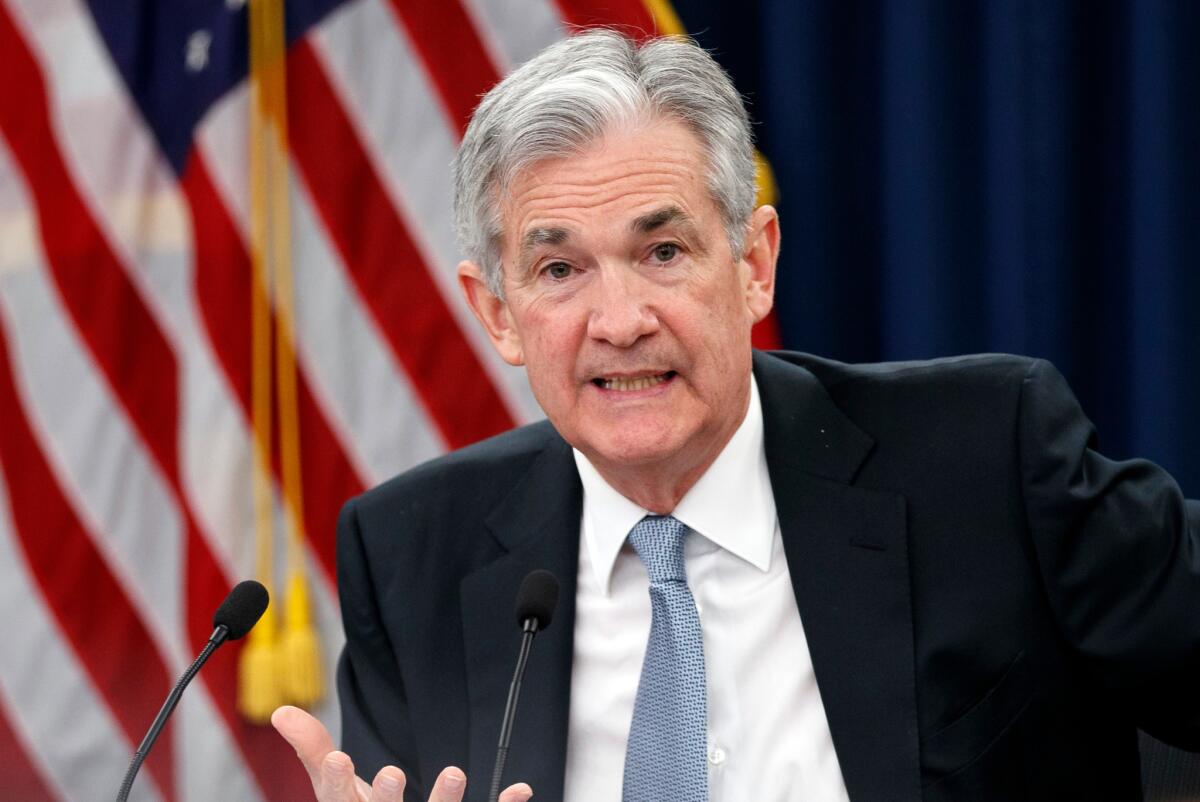Fed chair says it’s ‘too early’ to talk about lowering rates over coronavirus. Trump isn’t happy

- Share via
WASHINGTON — Federal Reserve Chairman Jerome H. Powell on Tuesday singled out the coronavirus epidemic as a threat to the American economy but said he expected China to take further actions to limit the damage and suggested that it was “way too early” to talk about lowering interest rates as a policy response.
That’s not what President Trump, and apparently some in the financial community, wanted to hear. Trump has been highly critical of Powell, whom he nominated to be the Fed chairman two years ago, persistently demanding that the central bank lower rates.
About 90 minutes into Powell’s exchange with members of the House on Tuesday, Trump took note of the Dow Jones having dropped since Powell began his remarks.
“When Jerome Powell started his testimony today, the Dow was up 125, & heading higher,” Trump tweeted. “As he spoke it drifted steadily downward, as usual, and is now at -15.” The Dow ended the day unchanged.
Private economists are increasingly concerned about how the virus will impact the global economy. Many have already downgraded growth projections for certain nations. The outbreak has not only idled China’s economic activity, it is spilling over to neighboring economies and beyond.
Analysts said Japan and Germany, the third and fourth largest economies, could slip into a technical recession as a result. And global growth overall is expected to take a hit this year because China has been the world’s leading economic engine and plays a crucial role, particularly in trade and manufacturing.
Powell, however, was cautious in speaking about the virus at the Fed chairman’s semiannual appearance before lawmakers, saying it was premature to estimate the impact.
“The question for us really is: What will be the effects on the U.S. economy? Will they be persistent? Will they be material?” he told members of the House Financial Services Committee. On Wednesday, Powell will appear before the Senate Banking Committee.
Powell said that the American economy is in a “very good place.” Job creation is strong and the economy, in its record 11th year of expansion, is continuing to see moderate growth.
The Fed’s latest forecast sees U.S. gross domestic product advancing 2% this year, similar to most private estimates and about a full percentage point below the Trump administration’s assumptions in its latest proposed budget.
Powell sounded a note of confidence that the Chinese government would take additional steps to bolster growth, which could mitigate the slowdown there.
Already China has issued special bonds and lowered rates to inject more money into the economy. Local governments also have announced extensions or cuts in corporate tax payments, and more public spending is expected to help companies and affected people, said economists at UBS Securities in China and Hong Kong.
“I think you can expect the Chinese government to do lots of things to support economic activity, and they’ve said that ... they’re open to cushioning the economic effects,” Powell said.
Still, it’s uncertain how long it will be before the outbreak is brought under control. As of Monday, more than 42,000 people have been infected, with at least 1,000 reported deaths.
Although the problem has been centered in the city of Wuhan and China’s Hubei province, much of the country’s economy also has been in a kind of lockdown, with many factories, stores and offices remaining closed or operating only partially.
UBS economists said construction activity has been suspended even into April in some parts of China. Chinese tourism and consumer spending have plunged, and many multinational businesses are facing disruptions and delays in production.
In a survey last week of member companies operating in China, the American Chamber of Commerce in Shanghai found that 87% said the coronavirus will have a direct impact on revenue this year, with 24% expecting sales to fall by 16% or more.
Powell, pressed by lawmakers several times on the implications of the outbreak, said the U.S. could feel the effects on several fronts -- tourism, exports to China, supply chains and financial markets.
“It’s way too early to say whether what that will amount to,” Powell said. “We’re just going to have to wait and see.”
The Fed lowered interest rates three times from July to October to offset the effects of the U.S. trade war with China, a downturn in domestic manufacturing and slowing global growth.
Since then, the central bank has stood pat on its benchmark rate, at between 1.5% and 1.75%, and Powell on Tuesday reinforced the Fed’s stance that monetary policy was in the right place for now.
“If developments emerge that cause a material reassessment of our outlook,” he said, “we would respond accordingly.”
Trump has repeatedly pressured the Fed to lower rates, and his tweet Tuesday in the middle of the hearing suggested that he sees even more reason now for Powell to take actions.
Powell throughout has maintained a stiff upper lip in the face of the president’s criticisms and attacks, insisting that the Fed is independent and makes decisions without regard to politics.
Near the end of the three-hour hearing Tuesday, Powell was asked to explain why the Dow had declined since he began talking.
“I really, I really can’t,” Powell replied. “I’m not following the market as I sit here answering your questions.”
More to Read
Get the L.A. Times Politics newsletter
Deeply reported insights into legislation, politics and policy from Sacramento, Washington and beyond. In your inbox twice per week.
You may occasionally receive promotional content from the Los Angeles Times.











